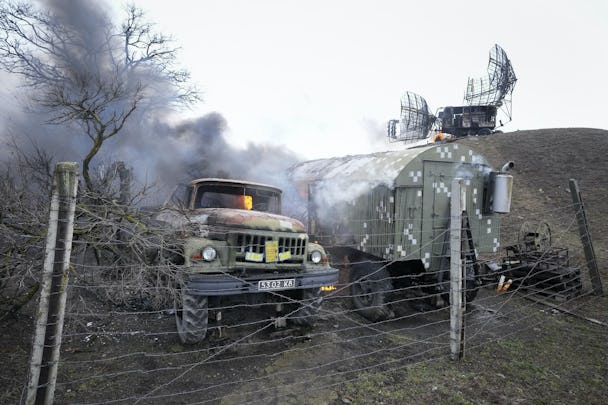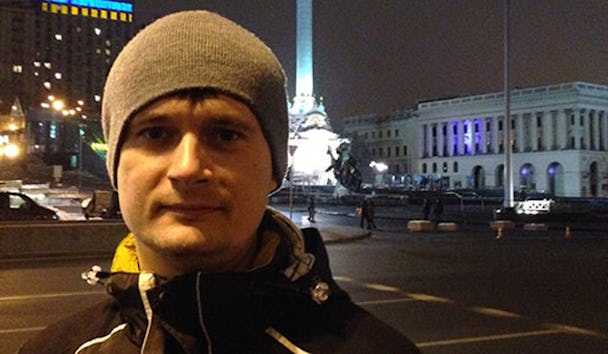”Our main priority right now is employment protection for those who may have to go to war”
What will happen to workers who are mobilized to fight the Russian invasion? The Ukrainian construction union is trying to make sure employment is protected during wartime, says chairperson Vasyl Andreyev.

Damaged radar arrays is seen at Ukrainian military facility outside Mariupol on the 24th of February.
“The members have jobs, almost everyone works as usual. There are no signs of panic. Our members in eastern Ukraine remain where they live, only a few people have moved to relatives further west,” said construction workers union Profbud’s chairperson Vasyl Andreyev to Arbetet Global on Wednesday.
Just hours later, the Russian invasion was a fact. And now a news set of issues have entered the trade union agenda.
“Our main priority right now is to agree with employers on employment protection for those who may have to go to war,” says Vasyl Andreyev.
“The law on mobilization says that you are entitled to keep your employment. But unlike 2014–2015, when we were at war last time, you are not entitled to retain your salary, only a small state compensation.”

Unlike 2014–2015, when we were at war last time, you are not entitled to retain your salary.
“We have members near the front line”
In the first years after the People’s Republics of Donetsk and Luhansk proclaimed independence from Ukraine, the construction union tried to maintain contact with members in the separatist-controlled areas.
Labour union officials helped members who wanted to escape violence and repression, among them employees in the cement industry, which in Ukraine is organized by the construction union.
“For the past four years, we have not been able to get in touch with the occupied territories. However, we have members who live near the front line. They will be hit by a first wave of attacks and may be forced to flee. We can not help them materially, but we try to support them morally,” says Vasyl Andreyev.
Russian invasion takes toll on aviation
Even before the invasion, the threat from Russia had hit the aviation industry hard.
“First, the pandemic caused the flights to stop. When we were about to get started again, the threat of war came,” says Mikhail Kozytj, chairperson of the Ukrainian aircraft workers’ Union, which organizes airport staff.
Most airlines avoided Ukrainian airspace, and few flew to Ukraine.
“At the smaller airports, our members go without work. At airports near the border with Russia, they have instead been tasked with doing surveillance and guard duty,” says Mikhail Kozytj.
Solid support for Ukrainian independence
According to Russian President Vladimir Putin’s rhetoric, Russia must intervene militarily to save Russian-speaking Ukrainians from persecution. In the construction union, however, the support for Ukraine’s independence is solid, even among Russian-speaking members, says Vasyl Andreyev.
Mikhail Kozych, himself a Russian speaker, finds it difficult to remain calm when Russia is mentioned.
“I will be the first to go out and defend our country.”
Russia and Ukraine
On the morning of February 24th, Russia launched an invasion of Ukraine.
Until 1991, both Ukraine and Russia were part of the Soviet Union. Since then, Ukraine has alternately been a close ally of Russia, alternately trying to get closer to Europe.
In 2014, Ukraine’s pro-Russia president Viktor Yanukovych was overthrown in a revolutionary uprising. His successors have tried to position themselves closer to the EU and NATO.
In connection with the uprising, the Donetsk and Luhansk regions of eastern Ukraine declared independence. The regions are dominated by a Russian-speaking majority and the separatists are considered to have had military support from Russia. On February 21, Russia recognized the independence of the regions.
In the spring of 2014, Russia also annexed the Crimean peninsula, in violation of international law. The low-intensity conflict that has been simmering since then has cost 15,000 lives.
By the end of 2021, Russia mobilized at least 100,000 troops to the Ukrainian border.
Several motives are considered to play a part in Moscow’s actions. One demand from Russia is that Ukraine should not be allowed to join the US-dominated defense alliance NATO.








